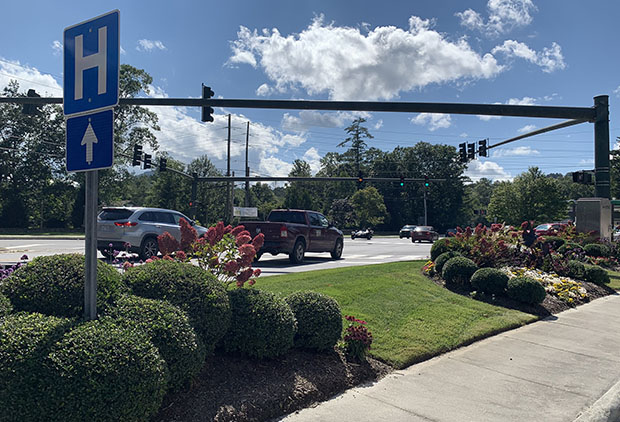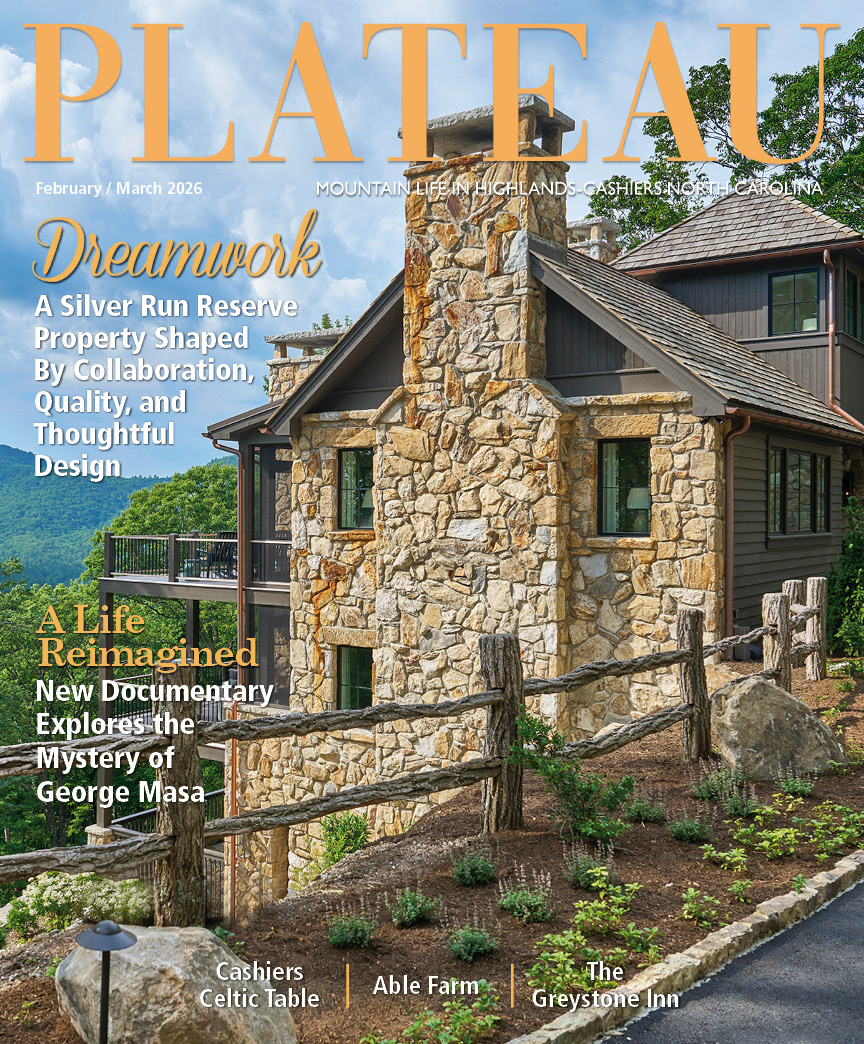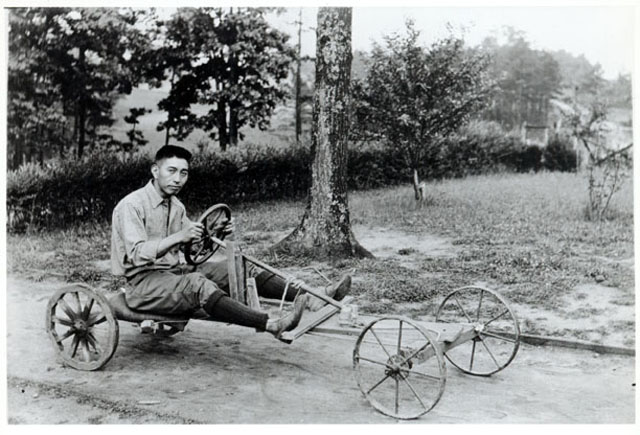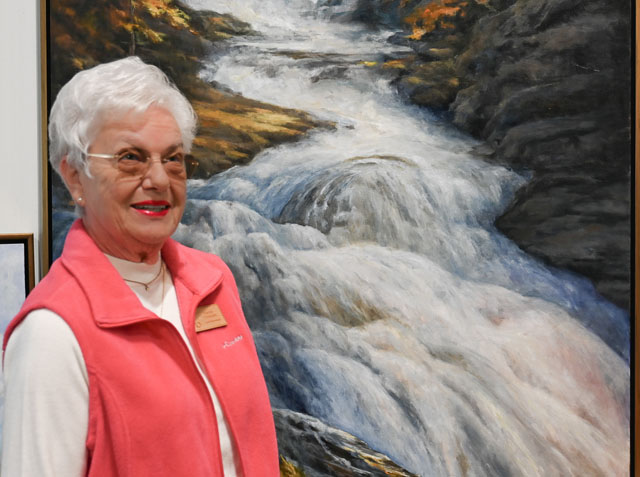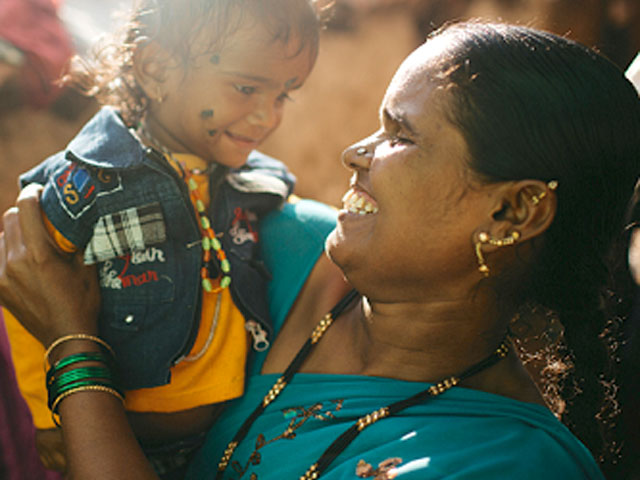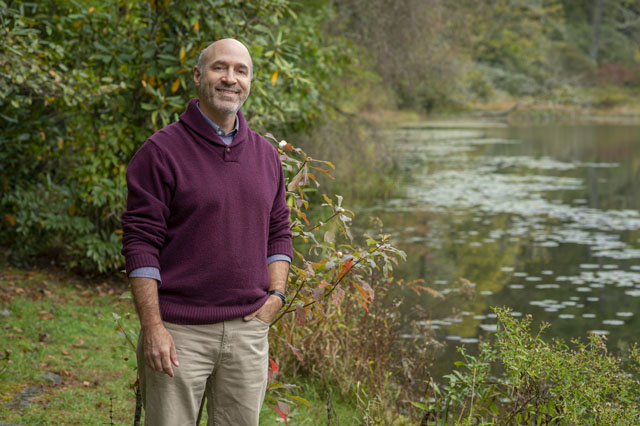Handbuilding Highlands’ Future
05 Oct 2020
Kaye McHan is piecing together a plan for uncertain times
By CHRISTA MILLER
Photos by SARAH LOWN
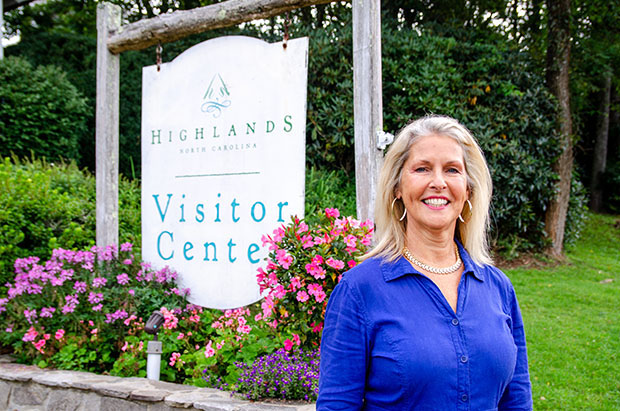
Six months into her new job as executive director of the Highlands, North Carolina Chamber of Commerce, Kaye McHan faced the unthinkable: a pandemic that threatened the lives and livelihoods of not just the Chamber’s small business owner members, but also those of the entire community.
In the hands of a newcomer, the crisis—demanding careful communication and collaboration across multiple stakeholders in both public and private sectors—might have been insurmountable.
But McHan was no stranger to the plateau. She’d previously served for nearly 12 years as a director at The Bascom, guiding the art gallery’s expansion from two rooms in the public library to its own space on its own land.
Eighteen years of nonprofit management experience gave her the foundation she’d need to respond to the COVID-19 pandemic. “I’ve spent a lot of time getting to know the town officials and what the town is trying to achieve so that we can align what we’re working on together,” she says.
As 2021 approaches, McHan and the Chamber are piecing together community wants and needs to sculpt a new strategic plan—one that combines pandemic transitions with a long-term vision.
The path to Highlands
McHan discovered Highlands “by accident,” searching for a place to eat during an off-season camping trip in the 1980s. “It was just magic, so beautiful,” she recalls. “How could you not embrace a place like this, surrounded by national forest, enveloped in Mother Nature?”
McHan ultimately purchased a second home and, later, became a resident. Even after a post-Bascom career change led her out of the area, she says, “Highlands gets in your blood, and I knew eventually I would return.” Throughout the interim years, McHan continued to visit the plateau, watching as Highlands matured.
About a year after her return to Highlands as a resident once more, the Chamber announced it was seeking a new executive director. “I jumped at the chance to work with our businesses, town officials and residents,” says McHan, “because I believe a great place to live is a great place to visit.”
Highlands is great, she believes, because of its residents’ community ethos. Residents eschew malls, big-box stores and fast-food establishments in favor of the personal touch of local small businesses and respect for the environment.
“I like to say [the people who live here are] curated,” McHan explains. “What is their heartstring, their love? That’s what they do in their business.” That a place like Highlands allows them to run a business that is meaningful to them, she adds, is what makes the difference.
The art of destination management
McHan says the Chamber’s role has gradually evolved throughout its 90-year history. Of course, it retains its original mandate to support the local business community by promoting favorable economic growth.
Because tourism is Macon County’s largest industry, though, McHan says promotion includes serving a dual role as a destination marketing organization. In 2019, for example, tourism in the county employed 1.45 thousand people and generated $35.13 million in payroll, along with $15.18 million in revenue in local tax receipts.
Through Visit Highlands, NC, the Chamber “informs, connects and inspires residents and visitors to drive destination economic impact and sustain the environment and quality of life in Highlands,” says McHan.
For example, just over $168,000 in tourism grants were awarded to local organizations in fiscal year 2019/20, supporting the arts, education and local events. Another $78,000 provided the community with concerts, fireworks, Halloween, and the Christmas parade and park lighting. McHan says, “That’s 24% of total expenses and does not include local contract labor and salaries. Again, a great place to live is a great place to visit; we invest in our community.”
Managing a destination through a global crisis
The first six months of any new leader’s role is to understand stakeholder needs before developing a strategic plan that moves everyone forward, together.
McHan picked up where she’d left off with The Bascom. “It’s the advantage of being in a small town,” she says. “I already knew the people I’m working with, [whether] business or personal relationships.”
Those relationships helped when COVID-19 arrived, and the strategic planning process took a back seat, McHan says, to “relevant and responsive” crisis communication. “We refocused marketing messages to safety messages, making sure our businesses and community had access to relevant information and education. “
Email, social media, signage, radio, newspapers and Zoom meetings all allowed the Chamber together with government leaders to share safety protocols, operational changes, needs, and strategies being implemented.
As the pandemic escalated, guiding businesses through lockdowns and closures became paramount. “We knew when businesses reopened, it would be tough,” McHan says. Owners hadn’t generated income for months, and the drop-in hotel occupancy eliminated revenue for the Chamber and lowered tax revenue for the town.
The Chamber’s response was to offer grants to help small businesses get back on their feet. They also worked with the Highlands-Cashiers Health Foundation to provide hand sanitizers to restaurants, as well as parks and public places around town. McHan says the feedback has been overwhelmingly positive.
Another Chamber program, Neighbors Helping Neighbors, has more than 50 volunteers from Highlands, Franklin, Cashiers, Sky Valley, and other Macon County towns who stepped up to ensure at-risk residents get the food and supplies they need without having to leave their homes. “I’m so proud of [the volunteers],” McHan says. “It makes a huge difference to the whole community.”
Looking towards Highlands’ future
Only now is the Chamber starting to be able to return to strategic planning and research. The messages around how to keep individuals alive have shifted to keeping the community alive.
“We started down one path, switched gears, and now we’re coming back to it,” McHan says. Additional research with visitors, residents, government officials and community leaders will help the Chamber to continue to adapt to the shifting “new normal” in developing 2021’s goals.
Taking that a step further, she says, involving people in the process is crucial for them to feel they‘ve been heard—and are part of coming up with the solution.
That’s apparent in the way the Chamber stepped up for the community throughout the pandemic. “[This] was a crisis never dealt with before, and we responded with compassion and concern,” she says.
McHan also expresses pride in the way the Chamber’s board of directors has approached research and strategic planning. “It sometimes feels like a monumental task,” McHan says, “but they believe in the value it brings to our work as we align with residents, businesses and government to keep Highlands the great place we live in.”
BIO
Birthplace: Fort Oglethorpe, GA
Family: One beautiful daughter, Sarah, and two perfect granddaughters: Dallas, 7, and Savannah Drew Taylor, 6
Education: BA, Music Education (Stetson University); BA, Visual Art Education (University of Central Florida); certificate, Nonprofit Management (Duke University); certificate, Nonprofit Fundraising Management (Indiana University / Purdue University; currently working on certificate as a Destination Management Executive
Hobbies: Music—voice, trombone; Visual arts—black and white drawing, acrylics painting, mixed media, ceramics; Outdoors—kayaking, hiking, camping, gardening


